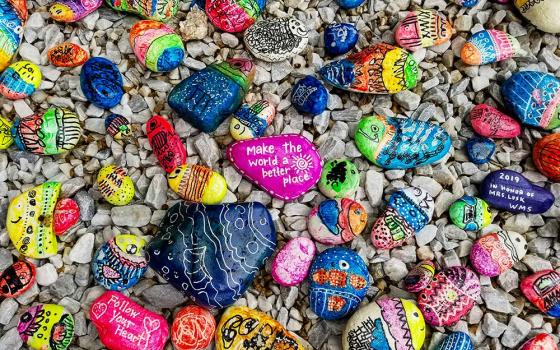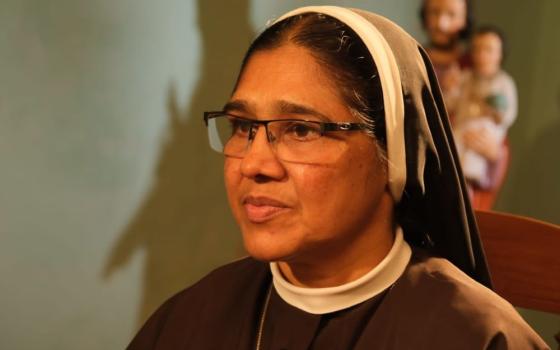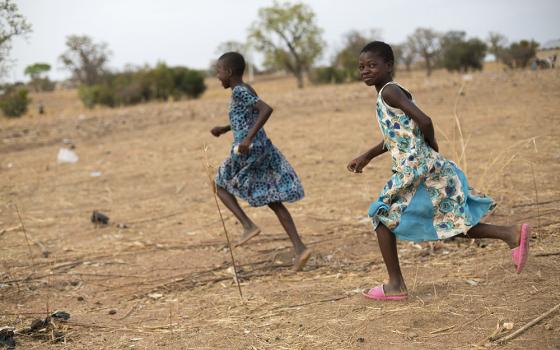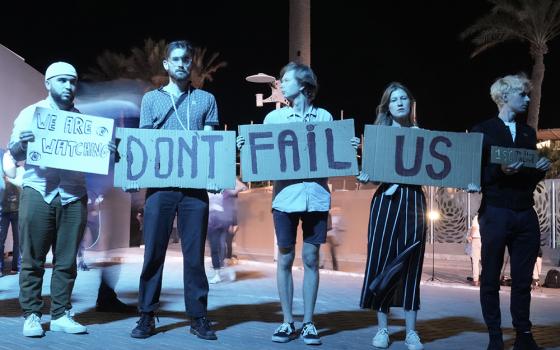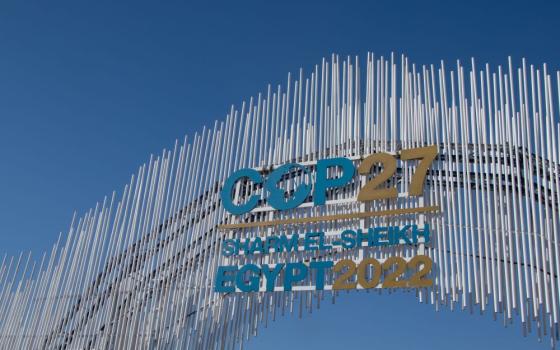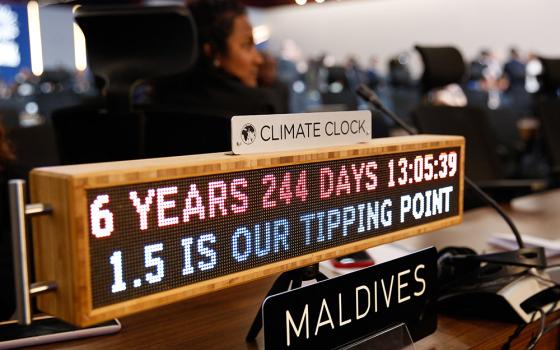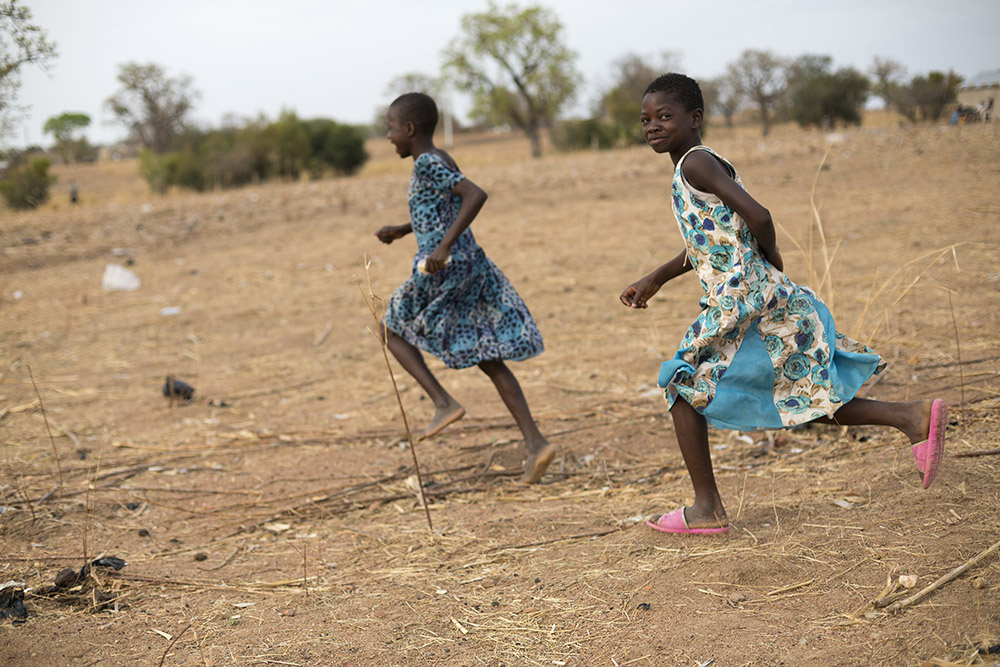
Children in Ghana run together through a dry field that has been severely affected by irregular weather patterns caused by climate change. (CNS/Courtesy of Catholic Relief Services/Jake Lyell)
UNANIMA International is a coalition of 23 communities of women religious, ministering in 85 countries with 25,000 members. For more than 20 years our focus has been on women, children and girls — groups that are consistently the most left behind. Our mission is to educate and influence policymakers at the global level on homelessness/displacement, migration, gender equality and climate change.
In more than 20 years as a nongovernmental organization, UNANIMA International has closely followed international climate change proceedings, in particular the Conference of the Parties (COP) to the United Nations Framework Convention on Climate Change.
As we prepared for our journey to COP27 in November, we remembered another journey — the visit by Mary to Elizabeth in the Gospel of Luke (Luke 1:39). The story is about relationships, and took place in the context of a journey. The encounter bears witness to the urgency of the journey: "Mary went with haste." We, too, went with haste and urgency as we journeyed to Sharm el-Sheikh, Egypt.
UNANIMA International has been preparing for the journey together for the past year, bringing our distinctive voices from our members in Kenya, the Philippines, Madagascar, India, Brazil, Mexico and Australia. In these places, the climate crisis/catastrophe isn't just another item on the agenda. Rather, whole livelihoods, lands and species face existential and extreme environmental threats.
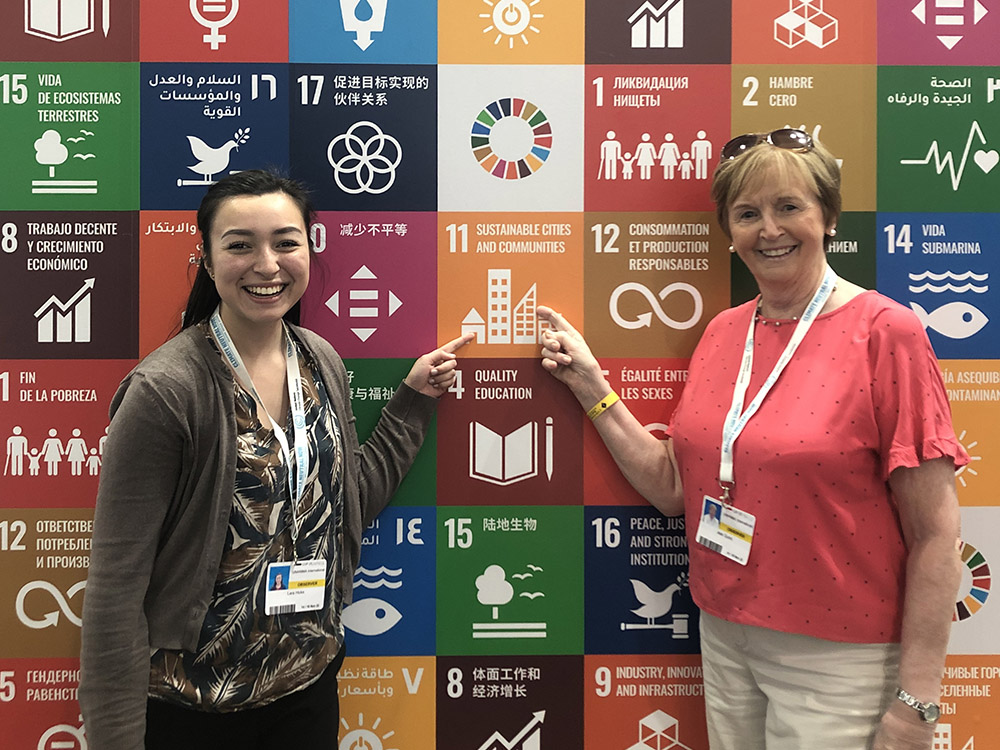
UNANIMA International executive assistant Lara Hicks, left, and Daughter of Wisdom Sr. Jean Quinn stand in front of an illustration of the U.N. Sustainable Development Goals at the COP27 climate summit in November in Sharm el-Sheikh, Egypt. (Courtesy of Jean Quinn)
We are now witnessing a world that is in a fragile state, where there are poor, overlooked and neglected women, children and girls. As UNANIMA International, we want to see change. We want to raise our voices and proclaim that things must be different.
In a society where women were oppressed and denied their rights, Mary and Elizabeth created the "space" to share their stories, their experiences of God, and their hopes for a better future, and where they dared to prophesy and proclaim their respective visions of liberation.
Likewise, at this time in our history, we created space at COP27 to hear sacred stories and engage in sacred dialogue. We found in our faith the hope and the strength to struggle for justice, for dignity, and the right to participate in the creation of a better future for all people. The journey we undertook each day at COP27 was for the people we represent who do not have a voice.
The 27th U.N. climate summit took place in Sharm el-Sheikh to finesse new agreements to fight climate change. These COP conferences have taken place yearly since 1995 (with the exception of 2020, when it was postponed due to the COVID-19 pandemic), from Berlin to Buenos Aires, Kyoto, Cancun, Bali, Marrakesh and Paris.
COP27 was a challenging daily journey for each of us. But at this COP, faith groups and members of civil society were more present than ever before. It was impressive to see daily demonstrations with young people demanding the phasing-out of fossil fuels. There were also beautiful dance groups and demonstrations in the so-called "Blue Zone," the conference zone to which those accredited had exclusive access. This Blue Zone had strong and extensive activities related to women, children and girls.
Advertisement
With Mercy International Association, VIVAT International, the Dominicans, the Carmelites and many other faith-based groups, we had extensive activities and thematic events within the Blue Zone. These groups of religious were carrying the stories of the people who have no voice and are usually left behind.
Like many members of faith-based groups, UNANIMA International had a long "wish list" of what we hoped would be achieved:
- Tangible action plans to rapidly reduce greenhouse gas emissions;
- Transformation to renewable energy sources and equitable phaseout of fossil fuels;
- Funding to developing countries for climate adaptation and "loss and damage";
- Just transitions for climate-impacted countries, communities and workers;
- Creation of policies and programs to prevent illegal mining and extraction activities, and to limit other projects in areas where biodiversity is endangered, in consultation and collaboration with stakeholders, including women and girls;
- Acknowledgement by world leaders of the connection between climate/environmental issues and family homelessness, and action toward transitions to green economies;
- National legislation making displacement of Indigenous groups from their land for conservation or development projects illegal (preferably through constitutional amendments).
We asked ourselves many times during COP27: Why do we want to be among these thousands of people? Some would argue that a few hundred diplomats could manage the haggling over the U.N. official documents under negotiation. But we participants have an impact, especially religious.
Like our work at the U.N. in New York, many new pledges and promises emerge on the sidelines of the official negotiations. The groups involved in this have been called "coalitions of the willing," wishing to make progress in specific sectors — and a historic victory for all of us was the decision to establish a loss-and-damage fund.
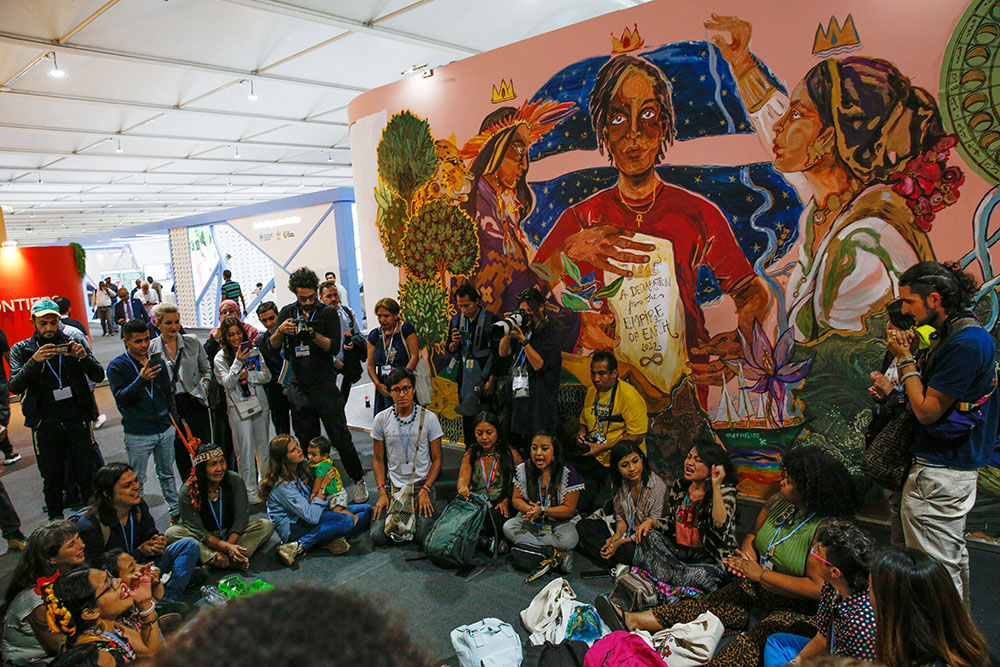
At the venue for the COP27 climate summit on Nov. 16 in Sharm el-Sheikh, Egypt (Flickr/UNclimatechange)
However, an urgent continuing need is decisive action against further increases in CO2 emissions. The text of the final declaration does not contain a clear commitment to reduce CO2 emissions globally from 2025 onward, which begs the question of how we are going to maintain the target of a maximum of 1.5 C global warming at all. The text also lacks a clear commitment to phasing out all fossil fuels.
At a "side event" with other faith-based organizations, UNANIMA International was asked to share our perspective on how COP27 fared in terms of progress on gender equity and climate displacement. We know that women, children and girls are disproportionately affected by climate disasters, yet the initial drafts of the negotiated text had very little mention or regard for women.
Thankfully, the finalized text was more inclusive of women's and girls' issues. It encourages parties to ensure gender-responsive implementation via the Lima Work Program on Gender (requiring gender balance and the integration of gender considerations). It also invites parties to support actions and implementation related to gender and climate change in the Global South.
There can be no climate justice without gender justice and the fulfillment of human rights. Women and girls facing the worst of the climate crisis often hold key solutions for adaptation, mitigation and sustainability. Acknowledgement of this at the end of the negotiations was a positive step, but it needs to be included in the COP process itself, so that the experiences and stories of climate resilience of vulnerable women and girls can be heard by decision makers.
UNANIMA International's focus, research and advocacy on family homelessness over the past few years has enabled us to become experts in this area. We always share the lived experiences of those — especially women and girls facing cycles of homelessness and poverty — with the U.N. and other international bodies. At COP27, we saw few mentions of housing as a human right and solution in the climate crisis.
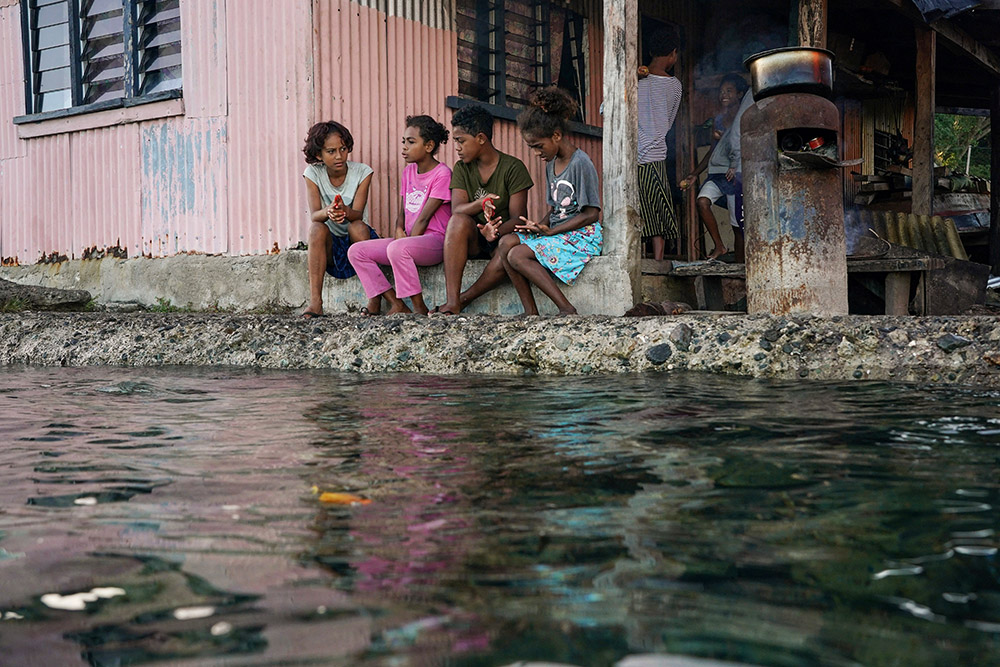
Village children pass the time in front of a home next to a flooding sea wall at high tide in Serua Village, Fiji, July 15. As the community runs out of ways to adapt to the rising Pacific Ocean, the 80 villagers face the painful decision whether to move. (CNS/Reuters/Loren Elliott)
Homelessness is a growing crisis that was already exacerbated by criminalizing policies, discrimination/exclusion, urbanization and COVID-19. Exceeding the 1.5 C maximum increase in global warming would cause billions of people to experience homelessness, trauma and insecure livelihoods.
The triple threat of climate change (climate, livelihoods and migration) is very real, immediate and urgent. It is our sincerest hope that this connection will be better highlighted in spaces like COP27, in member states' statements and especially in future negotiated texts. Ignoring the immediate relationship between displacement and homelessness in the climate crisis context is a missed opportunity to bring forth solutions related to slums, informal settlements and other precarious places where out-of-home people seek shelter.
Yet, we remain hopeful. Through collaboration between member states and civil society, two U.N. resolutions finally dealt with homelessness — largely unaddressed by the United Nations for 75 years. With momentum on this issue in New York, we hope we can make climate-related homelessness a larger priority for future COPs.
And so, reflecting on Mary's visitation and our unique journey to COP27, we journeyed as listeners to hear sacred stories, and to be prophetic in our speech and courageous in our actions at this global gathering. We achieved what we set out to do: In personal conversations with environmental ministers and senior policy analysts, we conveyed the stories of women, children and girls affected by the climate catastrophe in many countries where our UNANIMA International coalition members minister.
This sacred journey — undertaken on their behalf, and on behalf of those furthest left behind — was a privileged journey. Like Mary and Elizabeth, this journey took us to unknown places in ourselves, with others, and with the global community.


